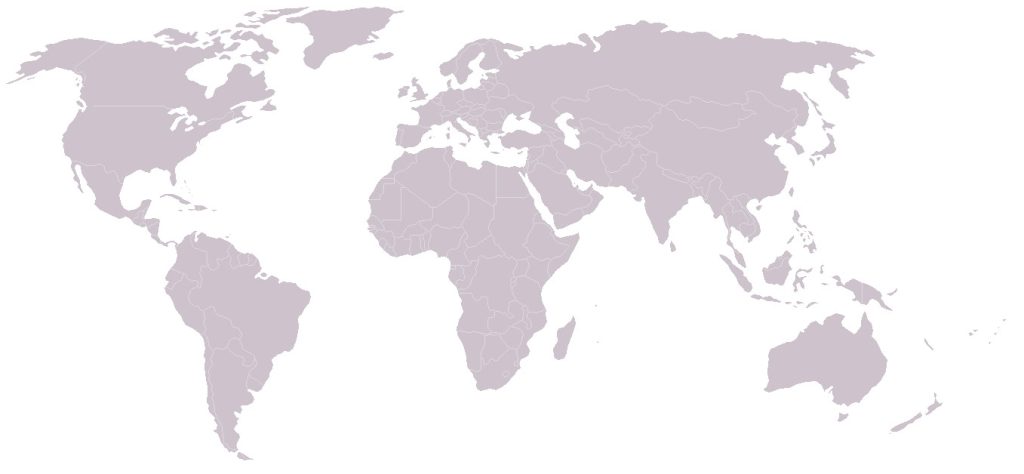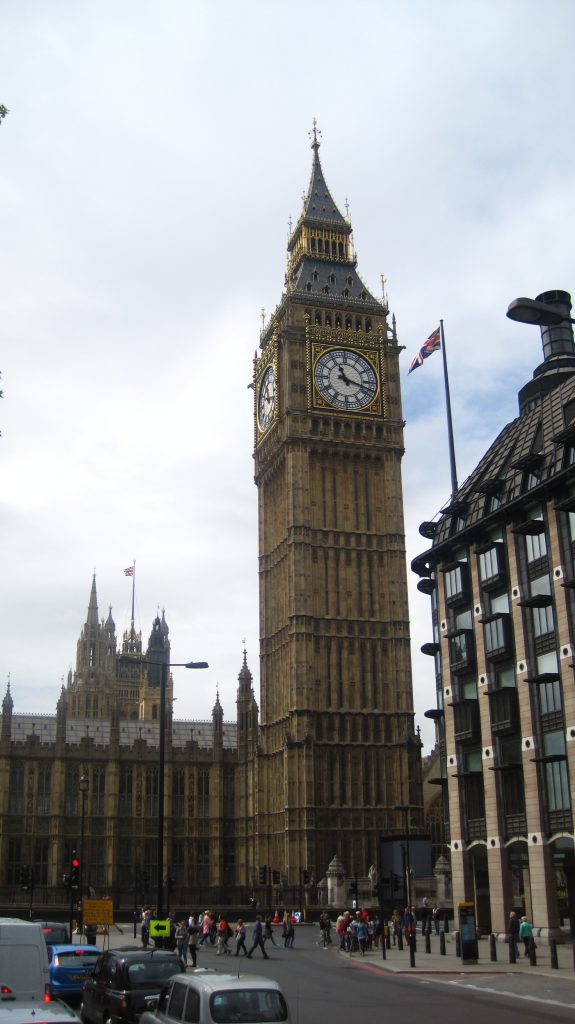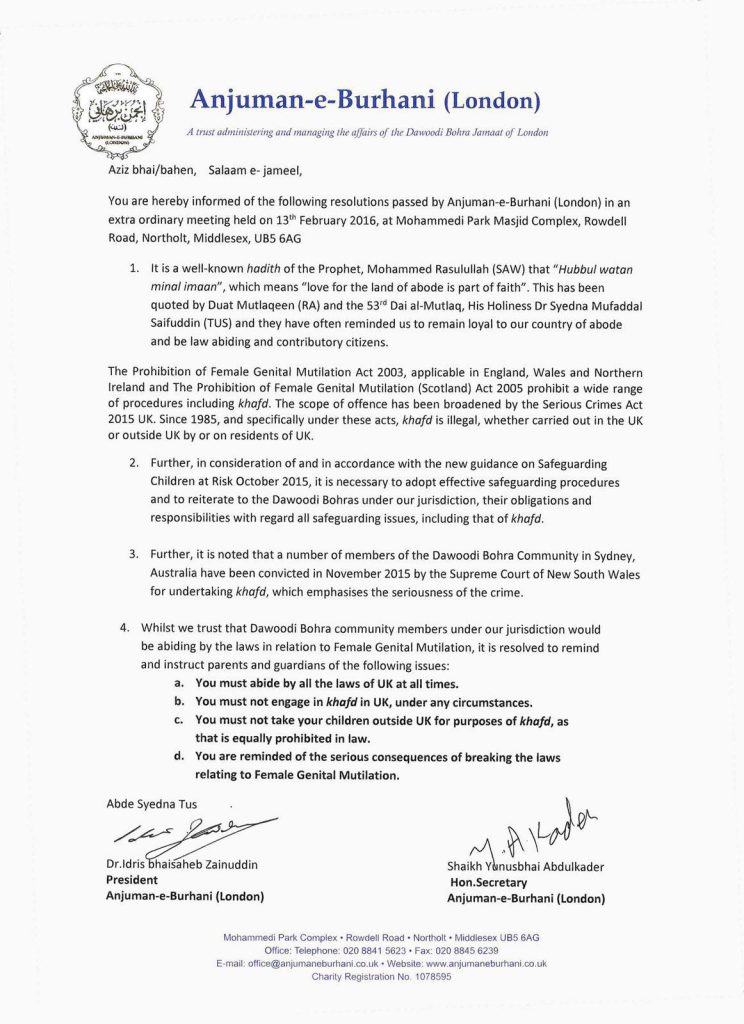I Will Not Be Silent – Ban Khatna Globally

Zehra Patwa Age: 45 Current Country of Residence: United States In 2014, I saw a video that changed my life. My husband sat me down, told me that this was going to be upsetting and showed me a video. It was a documentary from Australia featuring my cousin’s wife recounting her experience of being cut at the age of 7 in a dingy apartment in India by an old woman. Her telling of the story horrified me, which is the same reaction I have always had about Female Genital Mutilation (FGM) but what threw me was the fact that this was a Bohra woman, like me. She said this happens to all Bohra girls around the age of 7 and that it had happened to her sister, too. For a moment, I refused to believe it but as she kept talking, I realized that it could have been done to me too. I grew up in the UK and moved to the US in 1994. I immediately recalled that summer trip to India at the tender age of 7 to attend my uncle’s wedding. My mother had made me new dresses and I had matching hats and headpieces to go with them. It was going to be so much fun. What I couldn’t recall, though, was the actual khatna, but I have since received confirmation from my family that it was done to me. Even then, the reality did not sink in. How could I not remember it? Maybe it wasn’t done to me after all, maybe it was all a ruse to “save face”. What I’ve learned since is that some women erase the memory of the traumatic event completely and utterly. Sometimes, it can be restored and other times it can’t. I still haven’t accepted if it’s better to know or to not know. Either way, it feels like a violation. I cannot stand by quietly and let other girls in our Bohra community be subjected to this terrible practice. I will not be silent. Even though I do not recall my personal khatna, I feel lasting psychological damage has been done just knowing that it happened to me. I can only imagine the physical and psychological damage done to those girls and women who, to this day, have vivid memories of it. The Bohra jamaats in Sydney and Melbourne in Australia and, now, London in the UK have banned khatna (khafd). Why do our sisters from all over the Bohra diaspora still have to suffer when our sisters in Australia and London are spared? Are Bohra women valued more in some countries than others? All Bohra women are subject to the same rules and edicts from Aqa Maula, why is this any different? Khatna is illegal under Female Genital Mutilation laws in the US (18 U.S. Code § 116 – Female genital mutilation but if khatna should not be done by some Bohras, shouldn’t it be extended to all Bohras regardless of the law in that country? If you had a daughter in Dubai, would you still consider subjecting them to khatna if your sisters in Australia and the UK are specifically told not to?
Mariya Ali – London Bohra Resident – “Last Generation to Lose a Pinch of Our Skin”

By Mariya Ali I was born and raised in London, England and have been a lifelong member of the London Jamaat. Although FGM has been illegal in the United Kingdom since 1985, myself and many other girls have been subjected to this barbaric ritual, despite it being outlawed. After the Australian court case and subsequent convictions for circumcising two minor girls, the Sydney Jamaat issued a notice urging followers not to circumcise their daughters in Australia or abroad. On February 15th, the London Jamaat followed suit and issued a similar notice. The letter, similar in wording to the one that was issued by the Sydney Jamaat, points out that Islam mandates that its followers be loyal, contributing citizens who abide by the law of the land in which they reside. Despite the UK law explicitly stating that it is illegal to take a UK citizen outside of the UK for the purpose of circumcision, I know of many minors who were circumcised while abroad. It is important to note that this has also been addressed by the letter issued by the London Jamaat. It states that “You must not take your children outside UK for purpose of khafd as that is equally prohibited by law”. The London Jamaat is the first Jamaat after Sydney to publicly discourage followers from performing this procedure on girls. Although this is a huge step in the right direction, the notice that was issued does not condemn the practice itself, but rather it discourages followers from breaking the law. As a woman who has undergone this barbaric ritual, and on behalf of all of the other women who have suffered, do suffer and continue to suffer, I hope that this is the first of many Jamaats to follow suit and finally stamp out this practice. I thank the decision makers of the London Jamaat for taking this step and I sincerely hope that my generation is the last generation to lose a pinch of our skin.
After Australia, Bohras in London asked to stop practicing female circumcision

Now, a petition against khatna by UK Bohra woman

Voices against the practice of female genital cutting in the Bohra community seem to be getting louder and more numerous. The latest to speak out is an anonymous Bohra woman from the United Kingdom who was subjected to khatna as a child and remembers it as a traumatic incident. She has now launched a petition under the pseudonym “Luv Shabbir”, asking Nicky Morgan, a Member of Parliament in the UK, to do more to stop Female Genital Mutilation (FGM) in the Bohra community. This is the third online petition started by women from within the community to demand a ban on khatna for girls. The first was by the anonymous ‘Tasleem’ in 2011; the second, ongoing petition by 17 women from ‘Speak Out on FGM’ has already gained almost 30,000 supporters. Both these petitions emerged from India, where there is no law against female genital cutting and where Bohras are the only known group following the practice. In the United Kingdom, where several expat communities from Africa, the Middle-East and Asia follow various forms of FGC, the practice has been illegal since 1985. In recent years, the British government ahs been making concerted efforts to crack down on the practice. In this context, this latest petition by “Luv Shabbir” is indicative of two things: One, there is a growing desire among Bohra women to break the silence around khatna and speak out against it. Two, even in countries where there are laws against FGC, we have a long way to go before the practice meets its end. To support the UK petition, sign here.
It was a part of me…part of my womanhood…

(Trigger Warning: The story below is a powerfully, vivid account of one woman’s memory of FGC. We are grateful to her for sharing with us the details of her experience) By Mariya Ali Country: United Kingdom I have very few memories of my childhood, but one memory in particular stands out and haunts me to this day. Unfortunately, it’s a vivid, painful memory and fills me with anger when I recall it. I was five years old when my mother and aunt took my cousin and I on an “excursion”. I remember sitting in a car and approaching an unfamiliar block of apartments. I was confused; I didn’t know where I was and what I was doing there. Despite my seemingly endless young imagination, I could never have anticipated what happened to me next. I walked into a small apartment with a cramped living room at the end of a very short corridor. There was a dampness in the air and a slight smell from the poor ventilation. I approached the living room and sat on the floor. It was a warm day and I watched the net curtains of the large window slowly move with the breeze. I had been greeted by an old lady, whose face I can’t remember. I didn’t recognise her and was confused as to why I was currently in her apartment. I watched as she walked out of the room. I peered inquisitively into the kitchen and caught a glimpse of her heating a knife on the stove. I was always told to stay away from sharp knives at that age. Knives were dangerous. I could hurt myself. I remember the open flame on the stove and seeing the silver of the metal and the black handle of the knife while I watched her quickly hold it over the naked flame. She approached the living room with the knife in her hand, trying to conceal it behind her. She approached me. My mother asked me to remove my underwear. I remember saying no; I didn’t want a strange woman to see me without my underwear on. My mother assured me it would be okay; I trusted her and did as she asked. The old lady told me that she wanted to check something in my private area and asked me to open my legs. I was so young that I wasn’t scared at that time. I was confused, but not scared. I was innocently oblivious to how invasive and inappropriate this situation was and so I obediently did as I was told. I remember a sharp pain. An agonising pain. A pain that I can still vividly remember today. So intense that I still have a lump in my throat when I recall that moment. I instantly started sobbing, from pain, shock, confusion and fear. My next memory is that of blood. More blood than I had ever seen, suddenly gushing out from my most intimate area. I still didn’t comprehend what had just happened to me. I had believed that aunty when she had told me that she was checking something. I was young and naive enough to believe that people don’t lie and this was my first encounter when I realised that, unfortunately, the world doesn’t work like that. In so many ways I was stripped of many things on that day. My rosy outlook on life, my childhood innocence, my right to dictate what happens to my body and my faith in my mother not harming me. I continued to cry, the pain was excruciating and the sight of the blood traumatised me. I was given a sweet and comforted by my mother. The events after that are still hazy and my next clear memory is that of being back in the car and staring through teary eyes at the apartment building disappear as we drove away. Over the years I repressed this memory. There was no need to recall it. It was never spoken about and I still remained unaware of what transpired that day. A decade later, I was amongst some of my female friends. The topic of Female Genital Mutilation came up, or as I was to discover that day, “khatna”, a bohra ritual performed on young girls. Hearing their recollections of what had happened to them, I finally realised that this is what had happened to me that day. I was mutilated. Thankfully for me, I had a lucky escape. The unskilled, uneducated woman who barbarically cut me did not cause me too much physical damage. Emotionally and mentally, there are many repercussions. I have a deep phobia of blood and a simmering resentment that my mother chose for this to happen to me. Although my mother believed that she was acting in my best interest, I struggle to come to terms with the fact that I was so barbarically violated. It may have been just a pinch of skin, but it was a part of me, a part of my femininity and a part of my womanhood.
